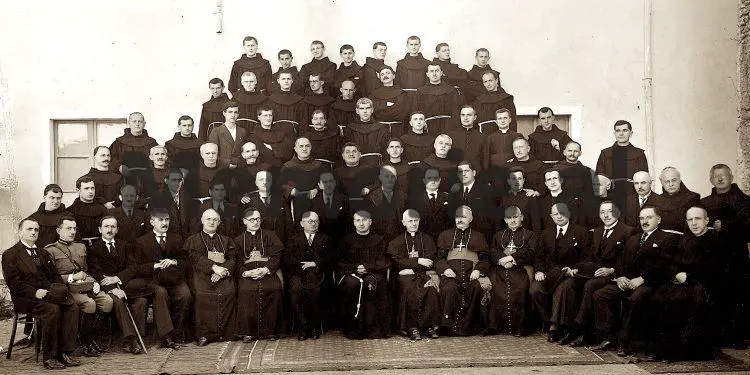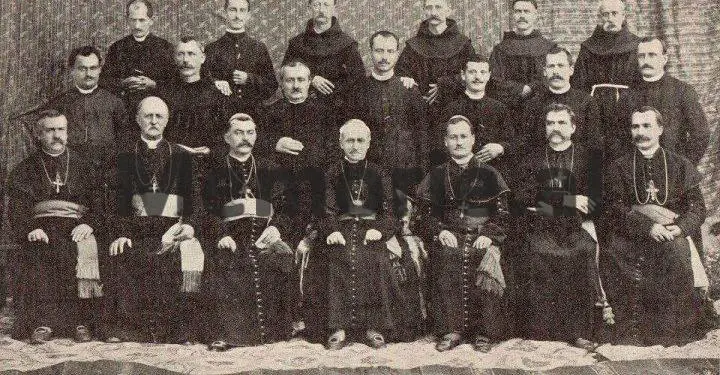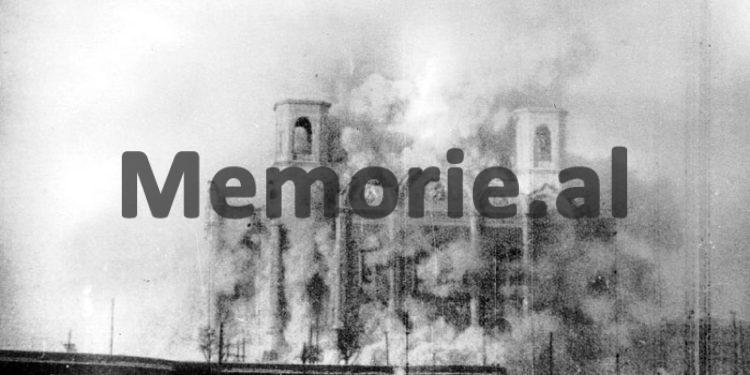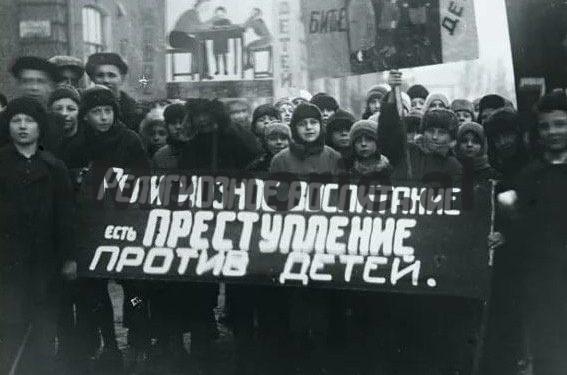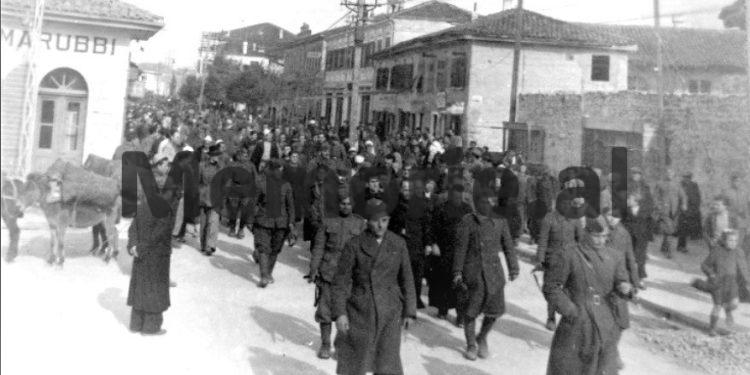By Jerina LUKA (Rasha)
The first part
Memorie.al / After the fall of Communism and with the changes that the political system underwent in Albania during the 90s, the country faced many challenges. One of these was the commitment to show what had happened during almost 5 decades of suffering. Seeking to inherit the memory of the facts, as they really happened, is a paradoxical effort, that in the case of totalitarian systems, history has proven, that the issue becomes even more problematic. Many of those who experienced the terror of this savage regime first hand did not survive. While others who have survived, do not manage to pass on what they have really taken away and are almost incapable of articulating the lived experiences to the end.
This article is an attempt to shed light on one of the victims of the communist dictatorship in Albania. He was Pader Gjon Shllaku, a Catholic clergyman, who belonged to the Franciscan order, researcher, educator of the young generation, of the time in which he lived. Shlaku was one of the central figures of the Franciscans.
He had an important engagement in the actuality of the time, being involved in the debates of that period, with the aim of emancipating the Albanian society. This article contains a brief description of Father Gjon Shllaku’s life and mainly analyzes some of his views, on various issues that he has addressed, through writings published in the magazine “Hylli i Drita”.
A brief description of the life of Father Gjon Shllaku
Who was Pader Gjon Shllaku and above all, what was his opinion, because of which the communist dictatorship decided to eliminate him physically? Kolë Shllaku (that was his baptismal name), was born on July 27, 1907, in Shkodër. He came from a simple citizen family that valued knowledge and culture. When Kola came of age, her mother enrolled her in the Franciscan primary school. He then continued to high school, where he distinguished himself as an excellent student.
On October 4, 1922, in Troshan, the day of Saint Francis, he put on the Franciscan robe and began his regular life there, changing his baptismal name to John and from that day on, he would be known by the name; John Shllaku. Later, like many Franciscan friars, Shllaku was sent to study abroad. He went to Holland, where he studied theology.
Then he returned to his homeland and on March 15, 1931, he was ordained a priest. In the same year, he went for further studies, (recommended by the then Provincial, Father Vinçenc Prennushi), in Louvain (or Leuven), Belgium. There, Father Gjoni, studied natural sciences and later, in 1936, defended his doctorate in philosophy at the University of Sorbonne (Paris), with the subject; “The actualism of G. Gentile”.
Immediately after completing his studies, he returned to his hometown and dedicated himself to regular and academic life. He started teaching at the “Illyricum” High School in Shkodër, the subjects of philosophy, French, politics and economics. For a period of time, Shllaku was the director and editor-in-chief of the magazine “Hylli i Drita”, in which he collected the sharpest feathers of the time.
In the hearth of Fishtjana, where for years the platform of free and advanced Albania was melted, the most prominent young writers and prominent cultural personalities sat down, such as; Faik Konica, Fan Noli, Eqerem Çabej, Terenc Toci, Mustafa Kruja, Ibrahim Dibra, Kasem Bajrami and many others.
He welcomed open thoughts, but without avoiding Christian principles and the development of Albanian culture. He had the great desire to bring the best and contemporary ideas of the civilized world to Albania and gave the temporary a new format, more attractive for the new generations.
He was entrusted with the management of the magazine “Djelmnia Antoniane”, a society that dealt with the life and cultural activities of the city of Shkodra. This society consisted not only of the students of the “Illyricum” High School, but also of the former students of this high school, professors, artists, writers, workers and well-known craftsmen. They organized plays, concerts and staged various works of classical literature.
On December 30, 1940, the night before he passed away, Father Gjergj Fishta asked to have Father Gjon by his side. Fishta chose exactly Shllak, as the person who would “leave bequests”, for Franciscan Province, schools, students, “Hylli e Drita” and Albania.
He probably saw in Father Gjoni, the worthy heir, to continue every task started by others, but enriched by Fishta himself, who probably gave the Province, the most excellent period, along with all the other Franciscan brothers.
Father Gjon Shllaku, due to his anti-fascist stance, was forced to emigrate to Yugoslavia when the fascist troops invaded the town of Rozafa in 1939. He returned to his hometown only in June 1940. He never accepted injustice, violence and oppression and was always in defense of human rights, a world view that he clearly conveyed through his editorials.
In Albania, under the guise of patriotism, ideas and principles of Bolshevik Marxism began to spread. Father Gjoni, as a well-educated person who knew well the consequences that these ideas would bring, decided to react, through a series of public conferences, on this topic.
It was January 1946, when he was arrested. He was accused of the most absurd cases and was tortured in prison. His defense lawyer in the ridiculous trial that was made up for him, was the former student of the Franciscan high school, Myzafer Pipa, who has already graduated in Jurisprudence at the University of Padua.
The brilliant defense he gave to Father John would later cost the young lawyer his life. Father Gjon Shllaku was sentenced to death and on March 4, 1946, he was shot at the age of 39, near the bank of the river Kir, in the city of Shkodra.
Shllaku was an intellectual of the European class. By training and instinct, he was a philosopher, although it can be said without fear that he had a keen sociologist’s eye or that he knew very well the psychology of Albanian society. Also throughout his professional life, he proved to be a serious academic and a skilled publicist.
The fate of the Catholic Church in Communist Russia
Father Gjon Shllaku, had spoken openly against Communism. He knew very well that communism in Russia had taken the form of a genuine economic, social and political system, but what could worry him even more was that this system required the elimination of religion. Father John knew very well the inspiring doctrine of communism, whose fathers were Karl Marx and Friedrich Engels.
They deny the existence of a transcendental supreme god, from whom everything comes and depends. According to Marx;”Religion is opium for the people”, while according to Engels;”It is necessary to get rid of everything related to the supernatural and the superhuman, declaring war on religions.” Marx and Engels were the fathers of another “religion”, which was called; “atheistic communism”.
Shllaku, as a man of religion and educated in philosophy, strongly warned against the evil that this new system would bring later.In fact, communism has turned out to be a totalitarian regime that has oppressed a large part of the people, and this is documented throughout the history of countries that have suffered from this system.
It was precisely this situation that frightened Father Gjon Shllaku, since this “religion” would bring about the transformation of Albania and determine the fate of the Church. He was aware that one of the first acts of the Bolshevik Revolution was to destroy all social influence of the Church in Russia.
On January 23, 1918, in Russia, the Council of the People’s Commissariat decreed the complete separation of the church from the state and schools and confiscated all church property and heritage. In 1923, two (openly atheist) newspapers were founded there, named: “Pa Zoti” and “School of those who have no God”.
Since 1920, many churches began to close in Russia; began the hunt against the clergy, accusing them of anti-communist actions and espionage, to the detriment of the regime. Under this excuse, hundreds of priests were arrested, tried, imprisoned, exiled to Siberia and a large number were sentenced to death.
A statistic referred to by the Soviet press office in London, dated August 21, 1941, gave the following data on the killing of clergy in Russia, where: of the 46,457 existing churches that were in 1917, only 4,225 remained open which , could practice a limited cult and would be controlled by the police.
Also, of the 50,960 priests who were there before the revolution, only 5,665 remain in office and were forced to swear loyalty to the laws of the communist state. Father John’s fear and intuition, his perception of the coming of a great danger, unfortunately, was confirmed, as what happened to the Russian Church, was later applied to Albania, to all faiths, but in particular the Catholic Church was hit.
Father Gjon Shllaku’s opinion on Bolshevik Communism
Father Gjon Shllaku knew that the communist regime aimed at absolute power and that this would bring dictatorship and tyranny. He had the ability to understand that in Russia, despite the fact that democracy was propagated, in fact the Bolshevik communists aimed to govern the country by a small group of people and the people only had to submit.
The developments in Russia worried Shllak, and for this reason, he published in the magazine “Hylli i Drita”, the article entitled, “Mourning in Russia. Ten million people, in the year 1933” (1934). In this article, the author analyzes in detail the political and economic situation in Russia, during the period of communism, established there since 1918.
He presents a very critical point of view on the situation in Russia and perhaps addresses this topic, for the readers of the magazine, not only for information purposes, what happens outside the Albanian territory, in distant Russia, but also to open the eyes of the country’s citizens his, what fate awaits people from such a system.
Perhaps Shllaku takes into account the fact that Russia has its historical influence in the Yugoslavia of that time, and being limited to Albania, he foresees almost prophetically, that Albania may be attacked one day, by what was happening in Russia. He was alarmed by the developments there and during the article, he writes:
“This catastrophe is not of this time, a phenomenon for which nature and the weather are responsible; The guilt rests on the conscience of the leaders of that country, who, in order to realize their own fierce idolatry, do not tear their heads off for millions of people, who will be sacrificed, as slaves of the Pharaohs, if they can get away with it. and above all, that fantastic pyramid of the proletarian state”.
According to him, Lenin did not have the patience to carry out a slow evolution, according to the original model of Karl Marx, but invented an “artistic revolution”, which he carried out through the popular mass, consisting of simple workers, farmers and soldiers, thus building the new communist state of Russia.
According to Shllak, the farmers soon realized that they were exploited and lied to by the demagogues of the then government, with the sole purpose of building a Bolshevik dictatorship. Thus 85% of the Russian population, which consisted of agriculture, was no longer of the same political opinion as the leaders of that government. For this reason, a strict and systematic war was launched against the farmers, who killed them, robbed them of their properties or imposed high taxes on them, which forced them to sell their properties.
The author in this article makes an economic analysis of Russia and is skeptical about the opening of factories for the Russian agricultural population, inexperienced in this new type of work. This, according to him, brought the poverty of 1922 to Russia. He considers it Stalin’s incompetence to transform Russia from an agricultural country to an industrial country in such a short time, only that he had the ego to pass it on. other countries, in the West.
The slag draws attention to the surplus production of vehicles in Nizhny Novgorod and that of tractors in Stalingrad. He also makes a balance for the trading of these products and analyzes the Russian foreign market, taking into account the competition that this country had with Poland, Germany and America.
The author comes to the conclusion that, due to the foreign market and competition, 85% of the tractors produced could not be sold outside of Russia, and therefore, they went out of use. Shllak’s opinion was that this caused the Russian nation, an inevitable economic disaster, which was stripped of everything and reached the point of starvation for bread.
Shllaku’s opinion about Albanian society
Father Gjon Shllaku was well acquainted with the psyche of Albanian society, very sensitive at all times and capable of analyzing it. This is found in some of his writings, published mainly in the magazine “Hylli i Drita”.
In the article from 1937, Padër Gjoni, presents his view of the scenario of Albania and Albanians, a quarter of a century after the declaration of independence.
Slag is of the opinion that; the Albanians, after more than two decades of self-government, with an Albania that is always friendlier to its neighbors;”who live and breathe that beautiful atmosphere of freedom and independence”, do not have to live with the fear that their homeland may be invaded again by foreigners, or feed themselves with exaggerated feelings of nationalism, but they must be protected from low local people and groups or, from some foreigners who may come to Albania, to ‘try their adventures…’!
In this article, he opposes the idea that; Albania and the Albanians are unable to recover as a nation, after almost five centuries of Ottoman rule, and that with a lot of work, ideas and prudence, the Albanians can prove to the world that they can line up in the ranks of the peoples of advanced.
Father Gjon Shllaku is aware of the reality of the times and the difficulties that the Albanians will face in achieving this goal, also due to the fact that as he himself writes: “Although small, both in terms of size and in terms of numbers of the inhabitants, this country of ours, is presented to us with an agglomeration of worldviews, diametrically different, so much so that it would be better, in order to strengthen the unity of national feelings, to eradicate them (the worldviews of different), all of them, let’s take the example of some of the countries of the west and, with the aim of designing a single value reference system, simply and exclusively national…”! Memorie.al
The next issue follows




